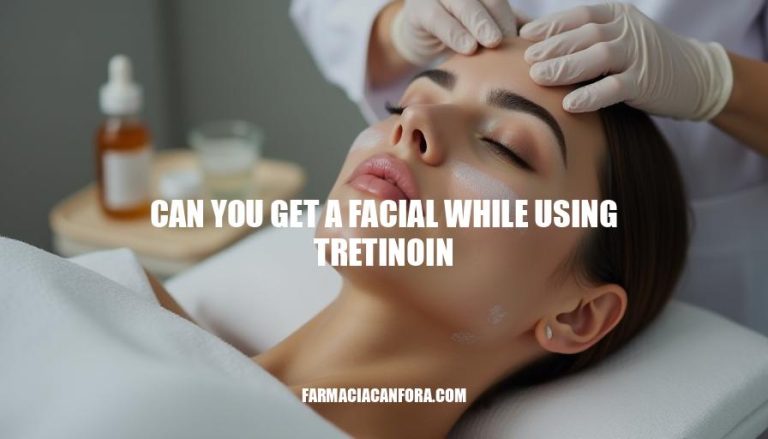


Tretinoin is a powerful ingredient that helps with cell turnover, acne, and skin texture. It’s often used in dermatological treatments to fight signs of aging, dark spots, and clogged pores.
When you’re using tretinoin, it’s essential to know how it interacts with different facial treatments. Some facials can make your skin more sensitive or irritated if combined with tretinoin-treated skin.
Treatments like chemical peels or microdermabrasion might need to be done carefully or avoided temporarily to prevent dryness and redness.
On the other hand, hydrating and soothing facials can help balance out the effects of tretinoin and keep your skin healthy.
To use tretinoin safely and effectively, it’s crucial to take some precautions. Adjusting its usage before and after facial treatments, talking to a skincare professional, and choosing gentle ingredients can help minimize risks while maximizing benefits.
Can you get a facial while using tretinoin? Yes, but it requires careful consideration of several factors to ensure your skin remains healthy and irritation-free.
Timing of Application: Avoid applying tretinoin on the day of your facial and ideally for a few days before the treatment. This allows your skin to recover and reduces the risk of heightened sensitivity during the procedure.
Skin Sensitivity: Tretinoin increases cell turnover, which can make your skin more sensitive, dry, or prone to peeling.
Opt for facials that are gentle and hydrating rather than those involving aggressive exfoliation or harsh chemicals.
Communication with Estheticians: Always inform your esthetician about your use of tretinoin. This helps them tailor the treatment to your skin’s needs and avoid products or techniques that could exacerbate sensitivity.
Types of Facials:
Safe Options: Hydrating facials and sensitive skin facials are generally safe as they focus on soothing and moisturizing the skin.
Facials to Avoid: Exfoliating facials, chemical peels, or treatments involving strong acids should be avoided, especially if your skin is already showing signs of irritation.
By following these recommendations, you can enjoy the benefits of facials while maintaining the health of your tretinoin-treated skin.
Yes, but it’s crucial to be mindful of your skin’s needs and take necessary precautions to avoid irritation.
Before getting a facial, consider the timing of application, skin sensitivity, and communication with estheticians about your use of tretinoin.
Opt for gentle and hydrating facials that won’t exacerbate sensitivity, and avoid exfoliating or chemical-based treatments.
By being aware of these factors and consulting professionals if unsure, you can enjoy the benefits of facials while maintaining healthy skin.
To maintain a balanced skincare routine, consider adjusting your tretinoin usage before and after facial treatments, choosing gentle ingredients, and prioritizing hydration to keep your skin healthy and irritation-free.